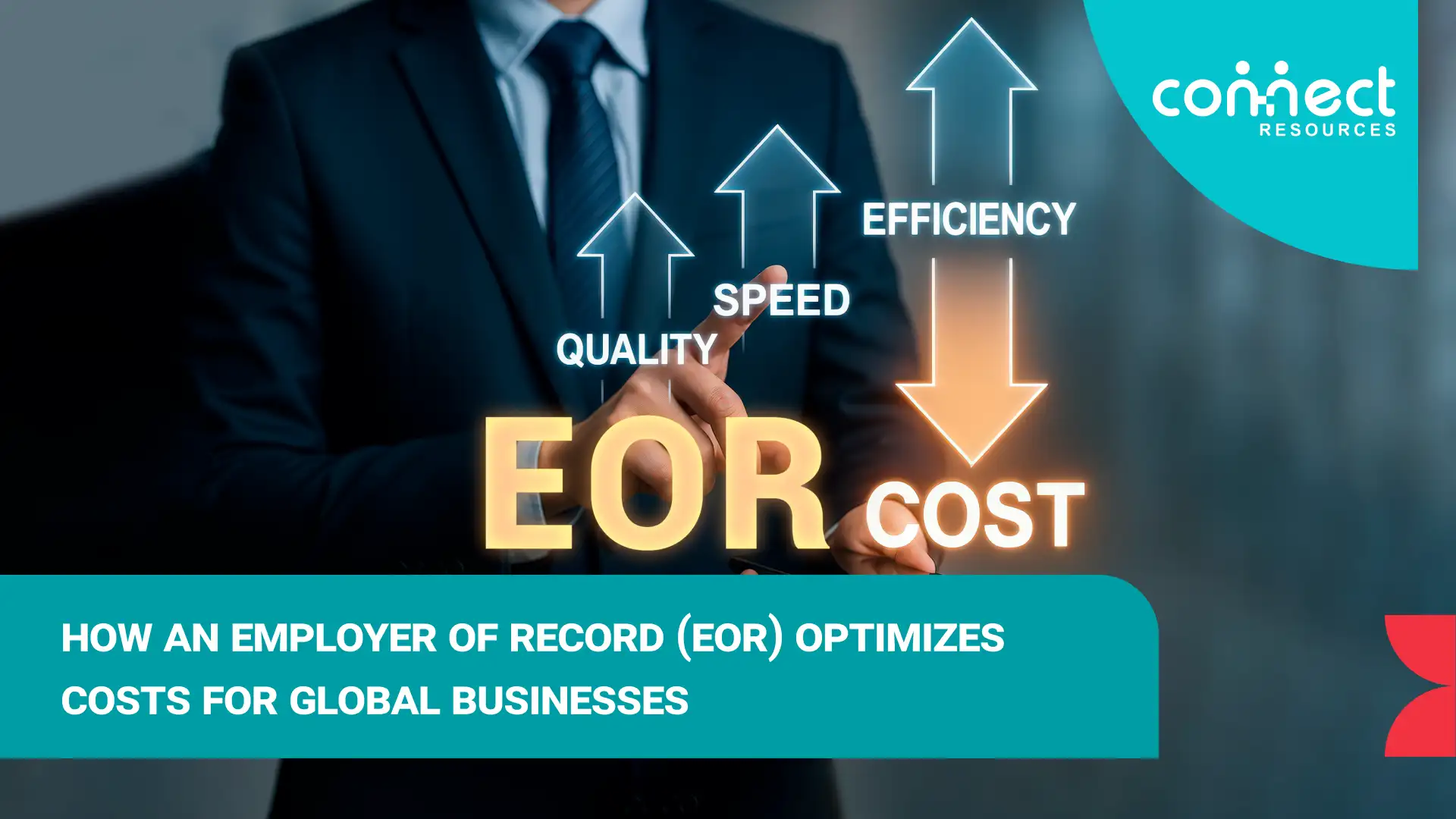This is the golden time for overseas businesses looking for global expansion in the Gulf Cooperation Council (GCC) region. Business-friendly policies, tax incentives, world-class infrastructure, and daring national agendas across the region have combined to create favourable conditions for businesses to thrive. Notably, the GCC region is home to a diverse and multicultural workforce across various fields.
An EOR (Employer of Record) service simplifies global business expansion by acting as a legal employer in the GCC on behalf of your company. So, they handle all legal and employment-related responsibilities, including payroll, compliance, employee benefits, and visa applications—all without requiring you to set up a legal entity in the region.
An EOR helps overcome potential challenges and identify growth opportunities in GCC countries. So, you substantially save time, money, and effort so that you can focus on business operations.
In this blog, we’ll explore business expansion challenges and opportunities in the region and the undeniable role of EOR.
Continue reading to know:
GCC expansion challenges and role of global EOR Services
The following are the key challenges businesses often face and the areas where EOR can play an irresistible role:
Regulatory and legal complexity
Let us begin with three key points:
- The Middle East has a long-standing reputation for complex regulatory frameworks and legal guidelines governing foreign investments and business within the region.
- The GCC countries, particularly the United Arab Emirates (UAE) and Saudi Arabia, are undergoing major legal reforms.
- The GCC enforces stringent rules and regulations to ensure compliance, drive economic development, and promote public safety and accountability.
All this means businesses planning to enter the GCC market must stay informed about and comply with these evolving laws.
The challenge is keeping up with evolving regulations and ensuring compliance is easier said than done. On top of that, local laws governing business operations and employment vary across the region, making it even tougher. Noncompliance with a minor law can result in hefty fines, penalties, reputational damage, or even the cancellation of a trade license in the GCC.
Navigating immigration and visa regulations
GCC countries are constantly reforming visa systems to attract skilled professionals from other countries while increasing local employment.
For example, Emiratization in the UAE and Saudization in Saudi Arabia mandate hiring of Gulf citizens in the private sector. Recently, Saudi Arabia suspended the issuance of one-year multiple-entry family visit visas for 14 countries, sparking logistical and financial concerns among businesses, especially small and medium-sized enterprises (SME). Now, they can only get single-entry visas, increasing costs, concerns, and administrative burdens for them.
Bureaucratic procedures can lead to notable delays in visa and work permit processing, thus affecting business operations.
Cultural differences and local customs
GCC countries, especially the UAE and Saudi Arabia, boast a richly multicultural workforce comprising skilled professionals across various industries.
However, the business culture in the GCC is heavily influenced by Islamic practices and local traditional customs governing dress codes, greetings, workplace etiquette, body language, etc. For foreign businesses expanding to the Gulf, understanding and following these practices and customs is essential.
Mismanagement of these cultural differences can result in miscommunication and conflicts. Efforts to accommodate religious and cultural practices for a diverse workforce can pose different challenges for businesses not familiar with them. However, to be an ideal and successful business, you have to respect the cultural and religious beliefs of your employees, which is another big challenge when expanding your operations to the Gulf.
High costs and financial considerations
Before you establish your business in the vibrant Gulf market, it’s crucial to understand cost implications because they significantly impact the success of your venture.
- Business setup and licensing costs: Vary by the business type, location, and licensing requirements.
- Visa, immigration, and employee relocation: Work and residence visas are expensive, and adding in employee relocation, insurance, and accommodation makes the costs skyrocket.
- Operational costs: Include employee salaries, utilities, marketing, advertising, and miscellaneous.
- Costs involved in legal and regulatory compliance: This includes the costs of trademarks, patents, or copyrights, as well as the renewal of licenses and other related expenses. You must bear these costs of ongoing compliance because it is critical for maintaining your business’s good standing in the region.
Other costs involve office space rent, mandatory insurance, employee benefits, marketing costs, and many more. In short, the costs of operating in the Gulf are cost-intensive despite its massive potential.
Data localisation and privacy
All Gulf countries have transitioned from a limited regulatory framework to comprehensive data protection laws governing the collection, storage, processing, and distribution of data.
For instance, Saudi Arabia’s Personal Data Protection Law (PDPL), which took effect in September 2024, mandates data localisation and use. The UAE also follows the PDPL framework, complemented by stringent cybersecurity laws to safeguard digital infrastructure and data. Similarly, other Gulf countries have data protection laws in place.
This means:
- Companies must demonstrate their ability to show how data is stored, processed, and handled throughout its lifecycle. This creates localisation pressure, making it complex, especially for multinationals that need to operationalise compliance across various legal environments.
- Most businesses in the Middle East rely heavily on global Software-as-a-Service (SaaS) platforms, including HRMS, CRM, and marketing tools. But these platforms store data outside the Gulf. This may impose significant restrictions on cross-border data transfers.
- There is a growing need for purpose-built platforms to automate compliance, which can add unnecessary burdens and costs.
As local laws, market trends, and technology continue to advance, businesses looking to expand in the Gulf countries may face increased challenges.
Now, the good news is that by working with a GCC Employer of Record, you can effectively overcome these challenges and run your business smoothly in the region. Let’s discuss how:
Opportunities Offered by UAE Employer of Record Services
The following are the key benefits of the GCC Employer of Record (EOR) service when looking to enter and expand across the Gulf region (GCC) in the Middle East:
Rapid market entry in GCC countries
GCC EOR services support faster market entry with simplified, no-hassle processes. They act as a legal employer in the GCC region on your behalf, which means you don’t need to worry about anything. You already have experts who are fully knowledgeable about the country’s regulations and laws. They will be a legal employer for your international employees in the GCC country, and they will handle hiring, payroll, employee benefits, admin tasks, and compliance so that you can focus on your business operations — all without setting up your legal entity.
In addition, with the local expertise and already established infrastructure, your business will save huge costs, time, and effort.
At Connect Resources, our GCC EOR services support businesses planning to expand in any Gulf country. We understand all markets, local business laws, and employment laws.
Mitigate legal and statutory compliance risks.
Adherence to local employment laws is critical across the Gulf countries. However, as mentioned above, navigating legal and statutory compliance in the region is perhaps the biggest challenge because of varying and constantly evolving rules and regulations.
A local EOR UAE provider helps mitigate noncompliance risks by handling all your legal obligations. From searching for top talent in Gulf nations to drafting employment contracts to offboarding, they take care of everything on behalf of your company.
GCC EOR services also manage payroll and employee benefits as per the Wage Protection System (WPS), as applicable, to ensure complete compliance with local laws. That is how a GCC Employer of Record protects your business against reputational damage, legal disputes, and potential penalties.
Flexible options for scaling your business
The market in Gulf countries is highly dynamic, which means rapid and unpredictable shifts in market trends and economic conditions. So, any business in a dynamic market should have huge scalability to keep pace up and down with market conditions.
Fortunately, an EOR UAE provider helps businesses achieve this scalability and flexibility by handling all employment-related tasks, such as onboarding/offboarding, training, and payroll processing. This allows you to quickly add or reduce your number of employees as needed.
Enhanced employee attraction and retention
Like in any place, providing stable, compliant, and healthy employment experiences in Gulf countries leads to higher employee retention rates. Because your GCC EOR service provider will ensure that all employment-related responsibilities are fulfilled fairly and smoothly, it leads to happy and satisfied employees.
Happy employees mean an increased reputation for your business, which further attracts and retains top talent. This is because employees like to work with companies that take care of their localised benefits and ensure job security and other perks. Such companies develop strong, lasting relationships with their workers.
Benefits from an EOR’s professional HR and payroll services
GCC EOR services support extends beyond onboarding and offboarding. As mentioned above, you get total support for HR and payroll needs tailored to your business and local laws in Gulf countries.
At Connect Resources, we use automated systems to manage HR and payroll services. So you can stay confident about timely and fair salary processing for your international employees. It is worth noting that our automated systems work according to regional mandates like the UAE’s WPS, and this helps minimise delays, errors, and the risks of noncompliance.
Partner with the best Employer of Record solutions in the Gulf
As you can see, there are many challenges on the path to global business expansion in the GCC region. However, the opportunities and benefits of business in GCC countries make it a popular choice among aspiring startups and entrepreneurs seeking global expansion in the Middle East.
By working with Connect Resource, you get complete EOR services support required to run your business successfully in compliance with applicable local laws.
Contact us to discuss more.


![Hiring EOR for global business expansion in Gulf GCC countries [challenges and opportunities] image blog](https://connectresources.ae/wp-content/uploads/2025/04/Hiring-EOR-for-global-business-expansion-in-Gulf-countries-challenges-and-opportunities-image-blog.webp)





